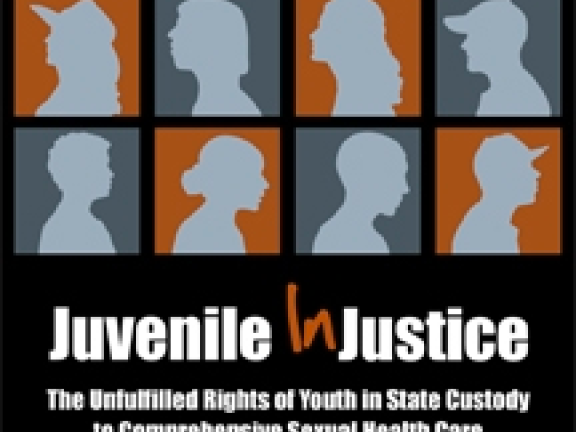Published December, 2010
Juvenile Injustice: The Unfulfilled Rights of Youth in State Custody to Comprehensive Sexual Health Care, December 2010, The Center for HIV Law and Policy

This is the first legal report and guide on the rights of youth in detention and foster care facilities to comprehensive sexual health care, including sexual medical care, sexuality education, and staff training on sexual orientation and the needs and rights of lesbian, gay, bisexual, transgender, and questioning (LGBTQ) youth. This publication analyzes the foundation of this right and the sexual health care needs of youth in out-of-home care.
Youth in state custody, particularly LGBTQ youth, are at higher than average risk of acquiring sexually transmitted infections and HIV, but there is not one state in the country that guarantees access to the necessary sexual medical care and scientifically accurate and inclusive sexuality education that would address this health crisis.
Youth in out-of-home-care report sexual activity at earlier ages, higher-risk sexual activity, and greater rates of STIs and HIV than youth who live with family members. These sexual health risks are additionally severe for LGBTQ youth, who are disproportionately represented in state detention and foster care facilities yet are largely ignored in health care and education services. According to a recent Department of Justice Report, gay youth are also more likely to be the victims of sexual abuse while confined to juvenile facilities.
Juvenile Injustice: The Unfulfilled Rights of Youth in State Custody to Comprehensive Sexual Health Care is the first in a series of publications that CHLP's Teen SENSE (Sexual health and Education Now in State Environments) initiative is developing for legal and community advocates as well as government and public health officials. Teen SENSE brings together medical experts, educators, government agencies, advocates, youth, and others to ensure that all young people in state facilities have access to comprehensive sexual health. Pending additional publications include model standards on sexual medical care, sexuality education, and staff training on LGBTQ issues that can guide policy-making in youth detention centers and congregate foster care across the country.
Copyright Information: CHLP encourages the broad use and sharing of resources. Please credit CHLP when using these materials or their content. and do not alter, adapt or present as your work without prior permission from CHLP.
Legal Disclaimer: CHLP makes an effort to ensure legal information is correct and current, but the law is regularly changing, and the accuracy of the information provided cannot be guaranteed. The legal information in a given resource may not be applicable to all situations and is not—and should not be relied upon—as a substitute for legal advice.